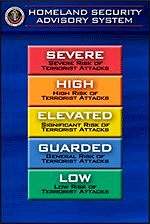Government Poisoning Public Opinion Against Private
Aircraft
When the TSA implied last week that GA would be a
likely tool, or even an accomplice, in an Al-Qaeda-style attack on Americans,
the country should have been outraged. Most Americans yawned; but
aviation groups picked up on the government's PR attack on our
livelihoods and hobby. NATA has answered, formally. Its letter to
ASA Hutchinson (pictured) -- the TSA's Under Secretary, Border
& Transportation Security -- is here for your
information:
Dear Under Secretary Hutchinson:
 The National Air
Transportation Association (NATA), the voice of aviation business,
is the public policy group representing the interests of aviation
businesses before Congress, federal agencies and state governments.
NATA's 2,000 member companies own, operate and service aircraft.
These companies provide for the needs of the traveling public by
offering services and products to aircraft operators and others
such as fuel sales, aircraft maintenance, parts sales, storage,
rental, airline servicing, flight training, Part 135 on-demand air
charter, fractional aircraft program management and scheduled
commuter operations in smaller aircraft. NATA members are a vital
link in the aviation industry providing services to the general
public, airlines, general aviation, and the military.
The National Air
Transportation Association (NATA), the voice of aviation business,
is the public policy group representing the interests of aviation
businesses before Congress, federal agencies and state governments.
NATA's 2,000 member companies own, operate and service aircraft.
These companies provide for the needs of the traveling public by
offering services and products to aircraft operators and others
such as fuel sales, aircraft maintenance, parts sales, storage,
rental, airline servicing, flight training, Part 135 on-demand air
charter, fractional aircraft program management and scheduled
commuter operations in smaller aircraft. NATA members are a vital
link in the aviation industry providing services to the general
public, airlines, general aviation, and the military.
Since the horrible attacks of September 11, 2001, NATA and our
members consistently have taken a proactive stance on the
operational security of our aircraft. We have consulted with
federal security experts at every level. We have worked
cooperatively with the Transportation Security Administration (TSA)
to implement the Twelve-Five Standard Security Program, which
applies to all commercial air charter operations of aircraft
weighing 12,500 pounds or more. We have approached the government
with an appreciation of your responsibilities to the public and
accepted our obligations to enhance aviation security. Until today,
NATA had believed our efforts to educate the TSA and others on the
diverse nature of this thriving industry and forge a positive
partnership with the federal government were bearing fruit.
 Earlier today, we received
Department of Homeland Security Advisory 03-019, "Security
Information for General Aviation Pilots/Airports." This document
contains contradictory, misleading and, in our opinion, factually
incorrect statements regarding charter and general aviation
operations. Despite NATA's efforts to provide numerous
security-oriented federal agencies with an understanding of the
composition and operation of this industry, it appears that their
managements have not taken to heart this knowledge.
Earlier today, we received
Department of Homeland Security Advisory 03-019, "Security
Information for General Aviation Pilots/Airports." This document
contains contradictory, misleading and, in our opinion, factually
incorrect statements regarding charter and general aviation
operations. Despite NATA's efforts to provide numerous
security-oriented federal agencies with an understanding of the
composition and operation of this industry, it appears that their
managements have not taken to heart this knowledge.
Quite simply, the Advisory presents an irresponsible picture of
the U.S. air charter and general aviation industry. Further, it
demonstrates the inability of government officials to distinguish
between private, non-commercial flight operations and those of
certificated commercial air charter operators subject to TSA
security regulations.
In scores of public and private security-related meetings
attended by NATA staff over the previous 20 months, officials have
consistently stated that the federal government is unaware of any
specific or credible threat involving the use of a private,
non-commercial general aviation aircraft or, especially, a
commercial air charter aircraft as a terrorist tool. In fact, this
Advisory was issued the very same day TSA general aviation security
officials were in a secured meeting with industry and those
officials made absolutely no mention of any security threat
prompting this Advisory. We hope you find this contradiction as
troubling as we do.
 Specifically as it concerns air
charter operations, we feel the Advisory has a fanciful notion of
how this industry operates. Air charter operators provide valuable
transportation services not available from any other source and are
subject to extensive economic, operational and security regulations
promulgated by the federal government. Yet, the Advisory portrays
these American-owned businesses as cavalier about security. This
breathtakingly reckless portrayal will damage the public view of
these operations at a time when they appear to be the only segment
of the commercial air transportation industry showing economic
promise.
Specifically as it concerns air
charter operations, we feel the Advisory has a fanciful notion of
how this industry operates. Air charter operators provide valuable
transportation services not available from any other source and are
subject to extensive economic, operational and security regulations
promulgated by the federal government. Yet, the Advisory portrays
these American-owned businesses as cavalier about security. This
breathtakingly reckless portrayal will damage the public view of
these operations at a time when they appear to be the only segment
of the commercial air transportation industry showing economic
promise.
To imply that a "Gold Card" is all a person needs to charter an
airplane is beyond understanding. Every air charter operator has
invested literally thousands of man-hours plus an equal number (and
often millions) of dollars to create and operate their businesses.
Predominantly privately held, family-owned businesses, their
proprietors often must use private assets - home equity and life
savings - to secure bank financing. To suggest that these men and
women would risk their aircraft, their businesses, their
livelihoods, their staff, their homes and frankly their lives
(since many are themselves pilots) for a quick buck from some
unknown person who drops by out of the blue is insulting.
The Advisory also states that "some agencies allow the use of
customer pilots." While we assume Federal Aviation Administration
(FAA) certificated commercial air charter operators are implied by
the term "agencies," we are mystified by the concept of "customer
pilots."
 Any pilot whom the
operator intends to permit to fly an aircraft on a charter flight
must first meet FAA-established experience and qualification
criteria and pass extensive, rigorous training and flight checking.
Only then will a pilot be authorized to fly a charter aircraft.
Furthermore, if this pilot will fly an aircraft weighing 12,500
pounds or more, an FBI Criminal History Background Check is also
required under the Twelve-Five Standard Security Program. For the
Advisory to suggest that a so-called "customer pilot" is casually
permitted to fly a charter aircraft at an operator's whim is
absurd, contrary to regulation and a disservice to the hard-working
men and women in this industry.
Any pilot whom the
operator intends to permit to fly an aircraft on a charter flight
must first meet FAA-established experience and qualification
criteria and pass extensive, rigorous training and flight checking.
Only then will a pilot be authorized to fly a charter aircraft.
Furthermore, if this pilot will fly an aircraft weighing 12,500
pounds or more, an FBI Criminal History Background Check is also
required under the Twelve-Five Standard Security Program. For the
Advisory to suggest that a so-called "customer pilot" is casually
permitted to fly a charter aircraft at an operator's whim is
absurd, contrary to regulation and a disservice to the hard-working
men and women in this industry.
The TSA's Twelve-Five Standard Security Program is the first
security-based regulation applied to this segment of the air
transportation industry. It provides specific security procedures
for
operators to follow while highlighting overall awareness of and
dedication to security concerns. The fact that the tasks in the
"immediate action items" and numerous other recommendations listed
in the Advisory are integral components of this program is not even
acknowledged. Furthermore, these are some of the same
recommendations promoted by NATA in September 2001. Quite simply,
none of this is new information yet it is portrayed as such to the
recipient.
Finally, NATA must ask why, if the information in this Advisory
is time-sensitive and critical, was it neither issued as a Security
Directive to all charter operators with Twelve-Five Standard
Security Programs nor posted on the secured Web site run by the TSA
specifically for the purpose of communicating with these regulated
parties?
Mr. Under Secretary, NATA and our members are extremely
disappointed by the lack of advance communication and absence of
understanding surrounding the Department's issuing of this
Advisory. We hope you share our concerns in this matter. As always,
we are ready to provide the time and resources necessary to ensure
your staff has the knowledge leading to insightful and productive
analysis of our industry.
Sincerely, James K. Coyne, President
[We await Mr. Hutchinson's reply or explanation --ed.]
 Aero-TV: DeltaHawks Diesel Power Steps Into the Spotlight
Aero-TV: DeltaHawks Diesel Power Steps Into the Spotlight NTSB Prelim: Mooney Aircraft Corp. M20K
NTSB Prelim: Mooney Aircraft Corp. M20K ANN FAQ: Turn On Post Notifications
ANN FAQ: Turn On Post Notifications ANN's Daily Aero-Linx (12.20.25)
ANN's Daily Aero-Linx (12.20.25) Aero-News: Quote of the Day (12.20.25)
Aero-News: Quote of the Day (12.20.25)






